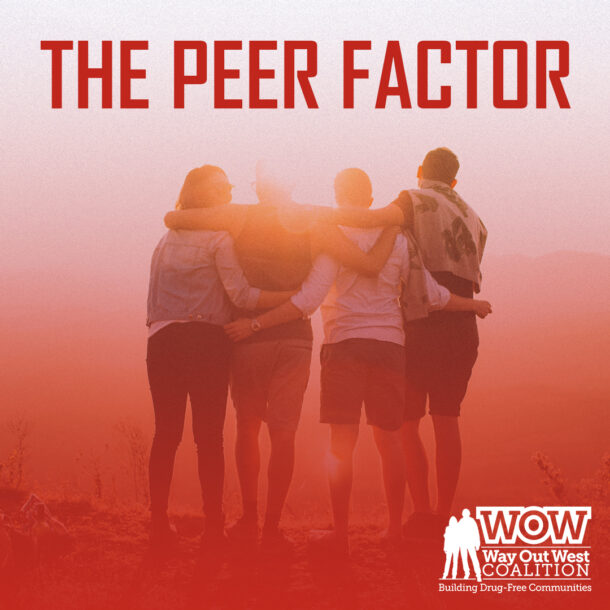Get in the Way Tip #7
Parents are the #1 influence on their kids growing up. BUT, as they get older, peers take on that influence. Teen’s priorities switch from making their parents proud, to making their peers proud; a people-pleasing mentality that is detrimental when the influencer is not a positive one.
So, What Can You Do?
Get to know who your teen hangs with and their parents, without being overly intrusive as to shut off communication entirely. Observation and a few open-ended questions. For example: How did they get to know their friend(s)? What are their friends’ hobbies/interests? What are their goals in life, or what do they hope to pursue as a career? Get to know their parents through any open doors, your questions and teen’s answers. You can gain a lot of insight through observation. These conversations open the door and allow trust to form between you and your teen, a vital component in influencing their decisions when you are not around.
(Side note on open-ended questions: Open-ended questions often get a person to think about things long after the initial conversation. One key to success is to ask a great question and then shut up. I know that is blunt, but I want you to get the point. Silence is good. It allows the person to process the question and think about the answer. In certain situations, it may help someone to understand their motives or reasons for specific relationships. It is basically, the why. Let me ask this; Which would be more productive; you telling your son or daughter what they should do or asking a great question causing them to think about things and realizing things on their own? All you did was ask a great question and point their mind in a specific direction making your idea (the question) their idea. Another critical point is to keep in mind, self-reflection and awareness usually happens after the fact may be hours or days after the question. All you did was create the opportunity for your teen to make your idea become their idea.)
When in need of addressing their friends’ behavior, make clear statements, and express your desire to see them succeed and do well in life. Your teen can and will most likely be on the defense for their friends, so this is important that you share your good intentions and let them know you care.
Establish “What if?” Scenarios

What if your teen is in a bad situation, like being at a party where they realize drugs are present and they want out, but they are afraid of what their peers will say or do. Establish a keyword or phrase that they can communicate to you over the phone, so you know to come and get them out of the situation. Talk about how to say “no” when others ask them to do, or pressure them into doing drugs, and reinforce a greater importance on respecting themselves when others attempt to drag them down with them. Make sure they know self-esteem and worth comes from within, not in others acceptance of them. That is why it is called self-esteem rather than other-esteem. Always verbalize you are there for them and love them.
Help your teen to think for themselves and be future-oriented in everything they do. Ask them where they see themselves going, who do they want to be in the future, and discuss how they are going to get there. (see Get in the Way | Tip #5 — Create Purpose: The IT Formula)
Preventing your teen from using starts at home, and if you are not exemplifying the same behavior that you expect from them, you are fighting a losing battle. Reinforce expectations of your teen throughout their childhood for the best outcome, as we say “early and often.” But if you have failed to do so, transparency goes a long way with your children. You can uphold your integrity through humility, so if an apology is needed, so be it – you will gain more ground in influencing your child’s behavior when they respect you.
Handling Online Associations and Friends
Encourage and advise your teen to follow positive influencers and express the reality that bad company corrupts good morals—both online and in person. This conversation is vital, as kids/teens are heavily influenced by social media and this can affect their self-esteem. Follow your teen’s account(s).
Be aware that some teens create separate accounts that they keep from their parents.
Conversations & Behaviors
- Get to know their friends and parents
- Practice “what if” situations and how to say “no”
- Be awake when they come home
- Model the behaviors
- “What would your future-self tell your present-self about your choices and behaviors?”
- “Where do you want to be after high school?”
Warning Signs
- Smelling alcohol on breath
- Problems concentrating or remembering
- Coordination problems
- Slurred speech
- Finding alcohol among their belongings
- Hangovers, nausea and vomiting
- Behavioral issues
- Change in social group
- Home or car related issues
- Low energy level
- Less interest in activities and/or care in appearance
- School or work issues
Negative Consequences
- Vandalism
- Inhibition and memory problems
- Abuse of other drugs
- Changes in brain development
- Alcohol Use Disorder
- Teens who start drinking by age 13 have a 43% chance of becoming alcoholic.
The WOW Coalition is a prevention association that promotes safe and healthy choices and responds to problems caused by alcohol, marijuana and Rx abuse by implementing strategies to prevent and reduce youth substance use. For additional information visit wowcoalition.org or contact at (623) 208-3230 or email: larry.tracey@wowcoalition.org.

